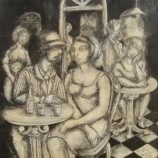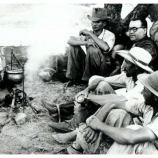Após a ocupação colonial nas Américas, a população brasileira passou a ser formada por colonizadores europeus, povos indígenas que já habitavam o território e escravos trazidos da África pelos colonizadores. Tudo isto fez da miscigenação étnica um fator marcante no Brasil tanto social quanto culturalmente. Tais fenômenos também tiveram como consequência um ícone muito marcante no Brasil que é a estratificação social.
É possível ilustrar isto no período colonial, mais claramente no ciclo da cana-de-açúcar. Nesta época o Brasil tinha uma pequena classe aristocrata, os senhores de engenho, uma parcela significativa de trabalhadores livres, alguns deles capatazes e capitães do mato, cuja missão era capturar os escravos fugitivos, subalternos aos primeiros. Desde então é possível detectar a existência de uma classe média e de forma superficial, esta estrutura ainda ilustra bem a sociedade brasileira atual.
Entre o período colonial até hoje o Brasil evoluiu, pela independência política, abolição da escravatura, proclamação da república, industrialização e urbanização. Este processo alterou os hábitos da sociedade brasileira, mas não sua estrutura básica.
O papel da classe média permanece, servindo e imitando os hábitos das classes que detêm o poder. É verdade que, mesmo sendo uma classe em que predominam os assalariados, faz grandes exigências em serviços públicos principalmente de educação e saúde. Atualmente há o fenômeno da nova classe média, a antiga classe “C”, que teve grande afluência nos últimos anos.
Esta classe média convencional, mesmo não estando diretamente ligada ao poder econômico, tem significativo poder de decisão política. Na história recente do Brasil encontramos vários exemplos disso.
A começar pelo golpe militar de 1964 que teve o fundamental apoio da classe média. Assim como no Chile e Argentina, o Brasil do presidente João Goulart pretendia implantar reformas para atenuar as históricas distorções sociais. A classe média foi para as ruas protestar contra a “subversão” da ordem e dos valores, escudada em argumentos religiosos, mas no fundo com medo de perder seu espaço para as camadas populares ascendentes, da mesma forma que ocorre agora em 2011.
Enquanto os militares trouxeram alguma prosperidade ao Brasil, a grande maioria desta classe esteve conivente com o regime e aproveitou para sobreviver com alguns trocados, aproveitando as benesses do clientelismo então praticado. Quantas pessoas deste segmento não aproveitaram a falta de regulação do Estado para se efetivar em órgãos públicos sem qualquer concurso? A classe média passou a se opor ao regime militar a partir do esgotamento do seu modelo econômico.
A ditadura manteve a maior parte da classe média inebriada com o milagre econômico, causado por políticas de arrocho salarial das camadas populares e pelos meios de comunicação criados ou incentivados pelo regime como o grupo Abril através da revista Veja, a Rede Globo de TV e o jornal Folha de São Paulo. No início dos anos 80 a população brasileira passou a sentir na pele o desemprego e a perda do poder de compra. Tudo isto motivou a classe média a desencadear o movimento Diretas-Já, que representou o golpe de misericórdia nos militares.
Em um período posterior a este, a classe média movimentou-se de forma totalmente manipulada pela mídia, para eleger Collor e depois jubilá-lo. Após a eleição de Collor o show político descambou para o circo e a inflação alcançou 2.000% ao ano, o que novamente afetou o consumo da classe média, o que a motivou a pintar a cara e derrubar Collor.
Com o impeachment de Collor e a posse de Itamar Franco o Brasil enfrentava o desafio de controlar a inflação. Itamar nomeou o senador, que era suplente, Fernando Henrique Cardoso como Ministro da Fazenda para implantar o Plano Real. O plano serviu como medida paliativa para a economia, mas qualquer pessoa consciente saberia que algumas medidas adotadas, como o câmbio fixo, poderiam trazer consequências catastróficas, como ocorreu na Argentina em 2001.
A classe média teve sua lua de mel com FHC em seu primeiro governo. Com o Real valorizado essa classe social pensou que poderia viver como os europeus e americanos, passar férias na Disneylândia, comprar carros importados, algo que nunca haviam experimentado. Enquanto isso o desemprego e a pobreza cresciam, mesmo camuflados com a cumplicidade da mídia. Assim em 98 FHC se elegeu com facilidade no primeiro turno. Porém logo no primeiro ano do 2º governo a carruagem da classe média virou abóbora, o câmbio ficou insustentável e o Brasil foi parar nos braços do FMI. Com um modelo semelhante à Argentina passou por uma grave crise econômica alguns anos depois.
As frustrações políticas da classe média foram escancaradas nos 8 anos do governo Lula, porém sem o poder de influenciar as camadas populares e interferir nas eleições. Quando se frequenta redes sociais ou debates promovidos na internet percebe-se que a ferida central deste fenômeno é a política que inseriu mais 30 milhões de pessoas no mercado de bens de consumo duráveis, o que levou o governo Lula a ter 87% de aprovação, o maior registrado na história do Brasil, e também à eleição de Dilma.
Para a classe média a miséria e a desigualdade social são uma diferença natural como o dia e a noite. Lembro Karl Marx que dizia que “a este respeito é irrelevante o fato de que se trata de necessidades do estômago ou da fantasia.” Ela é indiferente ao fato de que as pessoas que sempre viveram abaixo da linha da pobreza estão trabalhando, comendo e vivendo melhor, ao contrário, reclama dos salários dos diaristas, dos domésticos, dos pedreiros, dos bombeiros. É comum você ver pessoas desta classe reclamar por achar que paga muitos impostos, mas nunca param para pensar quanto o governo gastou para manter algum membro da sua família na universidade de graça.
Há 8 anos se pagava R$7,00 de diária a uma faxineira em Belo Horizonte e R$ 50,00 por mês no interior de Minas Gerais, para não ir muito longe. Uma de suas atitudes mais comuns é criticar o Programa Bolsa Família, alegando que hoje não se consegue mais mão de obra. Enquanto o primeiro mundo está em profunda recessão o Brasil e os parceiros da América do Sul estão em Pleno Emprego, e nossa classe média finge não perceber que é beneficiada por esta prosperidade.
Enquanto esta classe social tem condições de matricular filhos em escolas particulares, pagar um plano de saúde privado ou adquirir um automóvel novo não se movimentará para reivindicar uma escola, uma saúde pública ou um transporte público de qualidade, para a classe média estes serviços públicos são considerados da classe “C”. No imaginário desta classe média é importante esta segregação, este apartheid econômico, social e racial, o que mostra que o sistema social atual não é muito diferente do Brasil Colônia.
Artigos Relacionados











Comentários
Ótimo texto que apresenta de forma objetiva, do ponto de vista histórico e econômico, a postura da classe média brasileira a partir de seus próprios valores. Porém, creio eu, que faltou ao texto uma análise quanto à influência da imigração estrangeira, no final do século XIX e início do século XX, à formação desta classe.
Os valores da classe média tem a ver com o conceito de pequena burguesia de Marx, tão bem tratado no livro de Gorki. Ou seja, essa classe sonha e pratica os valores da alta burguesia, mas se esquece que pertence ao proletariado e é explorada pelo capital da mesma forma que são os trabalhadores mais pobres. Portanto, a classe média é necessária ao capitalismo como “colchão de amortecimento” às ações de cunho socialista e revolucionário.
Quanto aos trabalhadores e respectivas famílias ora ascendentes à classe média tradicional, entendo que é necessário haver uma revolução educacional e cultural junto a estes, no sentido de que eles não passem a reproduzir os mesmos valores conservadores arraigados citados no texto. Só assim poderemos ter futuramente uma sociedade realmente democrática e livre.
Lucas, Excelente seu artigo, divido em duas partes, uma parcela da classe é cega mesmo, a segunda é preconceito (perderam a mão obra escrava). Como pode um retirante nordestino, oriundo da classe operária ter o melhor desempenho como presidente da historia do país?
Ótimo e oportuno texto. Estamos diante de uma crise mundial e queremos saber qual caminho o Brasil vai seguir. Vai adotar a receita tucana ou vai apostar no emprego. Com certeza uma recessão vai desencadear uma onda de violência bem maior que dos oito anos de FHC. Lucas, não podemos esquecer que para evitar a vulnerabilidade das classes menos favorecidas é necessário que se faça uma verdadeira revolução cultural. A distribuição pura e simples de recursos financeiros, importante num primeiro momento, não garante a sustentabilidade de um modelo econômico que pretende diminuir as diferenças sociais.
ótimo texto, e a síntese do texto, esta na parte final do comentário de Bill, a cegueira intencional da classe média Brasileira, acompanhando os interesses dos grandes grupos econômicos e da grande imprensa.
Olá Lucas,
Gostei da base do seu argumento, mas eu tomaria mais cuidado com o economicismo… Não só a economia moveu a história brasileira, e o determinismo econômico engessa a possibilidade da ação humana…
Também acho importante historicizar os conceitos… Se é que existia uma classe média na América Portuguesa, ha controvérsias, ela distingue muito daquela do regime militar ou da era FHC…
Mas concordo em muito do que disse, especialmente a cegueira intencional da classe média brasileira
Abraços